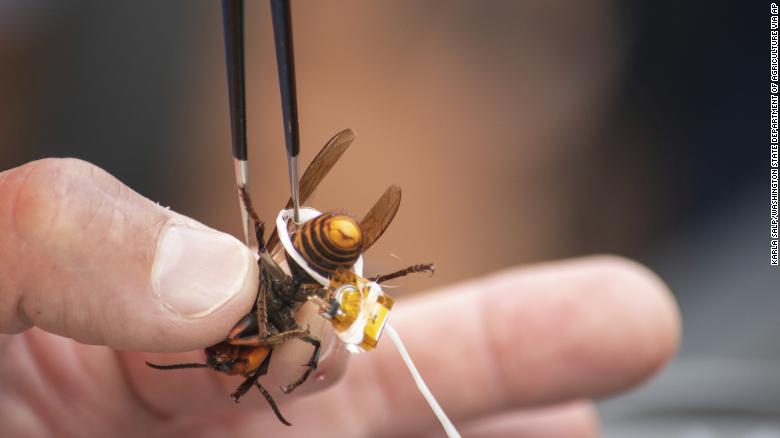Another “murder” hornet that could have led scientists to its nest has evaded experts once more, following a lost signal.
Last week, scientists with the Washington State Department of Agriculture (WSDA)captured a live Asian giant hornet — known as “murder” hornets for their ability to decimate honeybee populations — and used dental floss to attach a tracking device to its body, which “worked quite well,” said Sven Spichiger, WSDA’s managing entomologist, during a news conference on Monday.
When scientists released the hornet into the wild onto an apple tree, they were initially successful in tracking the insect, but after some time they were unable to locate a signal when it flew into a heavily vegetated area and then quickly darted away — thus evading the scientists.
Not all hope is lost, though, said Spichiger.
“We did get an initial direction of the flight,” he said. “We were able to meet with several of the property owners and get a few more eyewitness accounts of seeing hornets earlier the week before or earlier in the summer, and so we are starting to narrow down exactly where the hornets’ nest is.”
This isn’t the first time the state has tracked a live giant hornet. The team did so earlier this year, but the tracker fell off the hornet due to gluing issues.
So far, Spichiger said there are at least two Asian giant hornet nests in Whatcom County in Washington, with a possibility of a third.
Once a nest is located, the plan is to vacuum out the hornets and use carbon dioxide gas to knock out any remaining hornets in the nest, he said.
Asian giant hornets are the world’s largest hornet, as they can become up to 2 inches long, according to the WSDA. What makes them so dangerous is that they can destroy a honeybee hive in a matter of hours, killing the bees by decapitating them.
If the hornet becomes established in the state, it will negatively impact the environment, economy and public health, the WSDA said.
Since the preliminary reports in 2019, there have been 18 confirmed Asian giant hornets found in Washington, but there have been even more additional sightings.
>>>details

